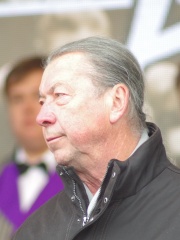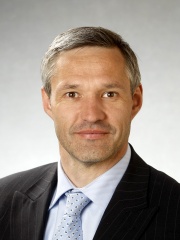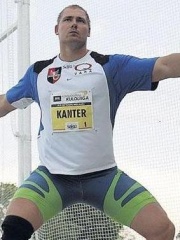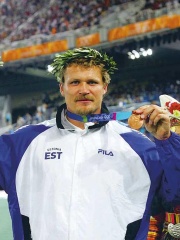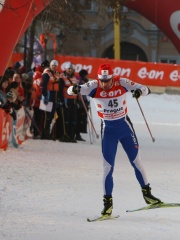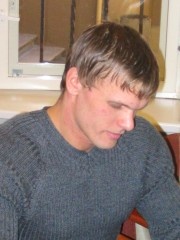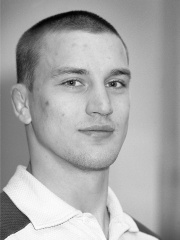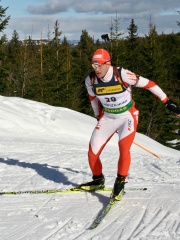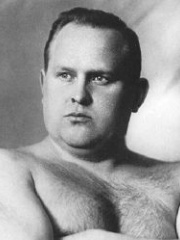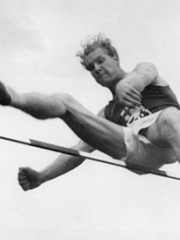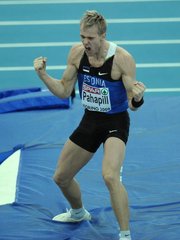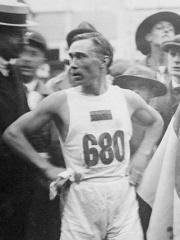

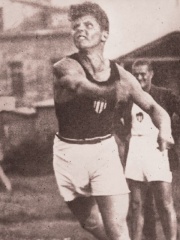
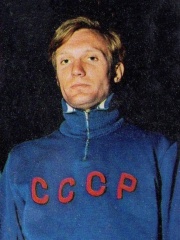
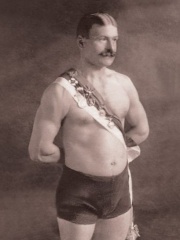
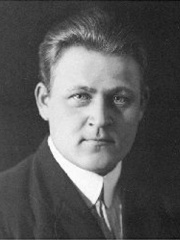
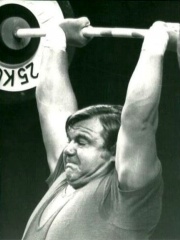
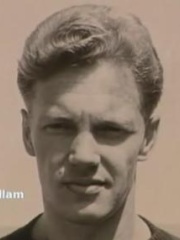
The Most Famous
ATHLETES from Estonia
This page contains a list of the greatest Estonian Athletes. The pantheon dataset contains 6,025 Athletes, 52 of which were born in Estonia. This makes Estonia the birth place of the 52nd most number of Athletes behind Uzbekistan, and Slovenia.
Top 10
The following people are considered by Pantheon to be the top 10 most legendary Estonian Athletes of all time. This list of famous Estonian Athletes is sorted by HPI (Historical Popularity Index), a metric that aggregates information on a biography's online popularity. Visit the rankings page to view the entire list of Estonian Athletes.

1. Jüri Lossmann (1891 - 1984)
With an HPI of 63.15, Jüri Lossmann is the most famous Estonian Athlete. His biography has been translated into 32 different languages on wikipedia.
Jüri Lossmann (4 February [O.S. 23 January] 1891 – 1 May 1984) was an Estonian long-distance runner. He finished second in the marathon at the 1920 Summer Olympics in Antwerp, at 2:32:48.6, trailing Hannes Kolehmainen by 13 seconds, but beating the third-placed Valerio Arri by almost 4 minutes. At the 1924 Summer Olympics in Paris, he was the flag bearer for Estonia and finished tenth in the marathon.

2. Roman Steinberg (1900 - 1928)
With an HPI of 62.80, Roman Steinberg is the 2nd most famous Estonian Athlete. His biography has been translated into 26 different languages.
Roman Steinberg (after 1938, Roman Kivimägi; 5 April 1900 – 20 May 1939), was an Estonian Greco-Roman wrestling bronze medal winner in middleweight class at the 1924 Summer Olympics in Paris, France. Steinberg was also three times Estonian wrestling champion 1921–1923, coached by Robert Oksa. He died after contracting tuberculosis, age 39, and was buried at Alexander Nevsky Cemetery, Tallinn.

3. Aleksander Klumberg (1899 - 1958)
With an HPI of 60.51, Aleksander Klumberg is the 3rd most famous Estonian Athlete. His biography has been translated into 31 different languages.
Aleksander Klumberg (since 1936 Kolmpere; 17 April 1899 – 10 February 1958) was an Estonian decathlete. He represented Estonia in several events at the 1920 Summer Olympics in Antwerp, and won the bronze medal in the decathlon at the 1924 Summer Olympics in Paris. In 1922, he became the first official world record holder in the decathlon. Arrested by the Soviet occupation authorities during World War II, Klumberg was deported from Estonia, imprisoned in a Russian Gulag camp from 1945 to 1954, and deported to Siberia in 1954–1955. Klumberg took up athletics around 1912 and, already in 1915–1917, set multiple records of the then Russian Empire in several jumping and throwing events. Besides athletics he won three Estonian titles in bandy. In 1918–1919, he fought in the Estonian War of Independence as a volunteer. After that he worked as a physical education instructor with the Estonian army (1919–20), military schools (1924–1926) and police schools (1927 and 1942–1944). Klumberg represented Estonia in several track and field events at the 1920 Summer Olympics in Antwerp. At the British 1922 AAA Championships he finished third behind Vilho Niittymaa in the discus, third behind Paavo Johansson in the javelin and third behind Vilho Tuulos in the triple jump event. In 1922, he became the first official world record holder in the decathlon (although with a performance inferior to the 1912 Olympics series of Jim Thorpe). Klumberg won the bronze medal in the decathlon at the 1924 Summer Olympics in Paris. Klumberg coached the national athletics teams of Poland (1927–1932) and Estonia, and in this capacity attended the 1928, 1932 and 1936 Summer Olympics. Klumberg was the coach of Janusz Kusociński when the Polish athlete won gold in the 10,000 meters event at the 1932 Summer Olympics in Los Angeles. After the Soviet invasion of Estonia during World War II, Klumberg was arrested by the Soviet NKVD in 1944 and deported from Estonia to Russia, where he received a lengthy prison sentence. From 1945 to 1954 he was imprisoned at the Dubravlag, one of several Gulag special camps in the Mordovian ASSR for political prisoners. After the 1954 release from the prison camp, he was deported to the Krasnoyarsk region in Siberia. Soviet authorities permitted him to return to Estonia only in 1956. He died two years after that and was buried at the Rahumäe cemetery in Tallinn.

4. Jüri Tarmak (1946 - 2022)
With an HPI of 60.30, Jüri Tarmak is the 4th most famous Estonian Athlete. His biography has been translated into 26 different languages.
Jüri Tarmak (21 July 1946 – 22 June 2022) was an Estonian high jumper who competed for the Soviet Union.
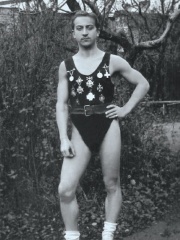
5. Alfred Schmidt (1898 - 1972)
With an HPI of 58.42, Alfred Schmidt is the 5th most famous Estonian Athlete. His biography has been translated into 27 different languages.
Alfred Schmidt (from 1936 Ain Sillak, 1 May 1898 – 5 November 1972) was an Estonian featherweight weightlifter who won a silver medal at the 1920 Summer Olympics. Schmidt first trained in long-distance running, and took up weightlifting in 1919 while serving in the Estonian Army. The next year he won an Olympic silver medal, and in 1922 a national title. At the 1922 World Championships he was not allowed to compete, as he surpassed the body weight limit of his division, and hence acted as an official and referee. He continued to act in this capacity after retiring from competitions in 1923. He also refereed wrestling competitions and was a board member of the Estonian Sports Union. Later he became known as a trap shooter and referee, and headed the Estonian Trap Shooting Federation.

6. Jaan Kikkas (1892 - 1944)
With an HPI of 57.45, Jaan Kikkas is the 6th most famous Estonian Athlete. Her biography has been translated into 21 different languages.
Juhan "Jaan" Kikkas (5 June 1892 – 9 March 1944) was an Estonian middleweight weightlifter. He won a bronze medal at the 1924 Summer Olympics, setting a world record in the snatch. Kikkas first trained as a cyclist, and changed to weightlifting in 1921, aged 29. Next year, he placed fourth at the world championships. In 1925, he won his only national weightlifting title. After retiring from competitions, he ran his metal workshop in Tallinn. He died there in 1944 during a Soviet air raid.

7. Harald Tammer (1899 - 1942)
With an HPI of 56.71, Harald Tammer is the 7th most famous Estonian Athlete. His biography has been translated into 21 different languages.
Harald Tammer (9 January 1899 – 6 June 1942) was an Estonian journalist, athlete and weightlifter. As a heavyweight weightlifter he won a world title in 1922 and a bronze medal at the 1924 Olympics. As an athlete he competed in the shot put at the 1920 and 1924 Olympics and came sixth and twelfth, respectively. He served as the Olympic flag bearer for Estonia in 1920, and as a representative of the Estonian Olympic team in 1928 and 1936.

8. Jaan Talts (b. 1944)
With an HPI of 56.34, Jaan Talts is the 8th most famous Estonian Athlete. His biography has been translated into 18 different languages.
Jaan Talts (born 19 May 1944) is a former Estonian weightlifter. He competed for the Soviet Union at the 1968 and 1972 Olympics and won a silver and a gold medal, respectively. Throughout his career, Talts won two world and four European titles and set approximately 40 world records.

9. Ilmar Kullam (1922 - 2011)
With an HPI of 56.17, Ilmar Kullam is the 9th most famous Estonian Athlete. His biography has been translated into 20 different languages.
Ilmar Kullam (15 June 1922 – 2 November 2011) was an Estonian basketball player who competed for the Soviet Union in the 1952 Summer Olympics. He was a member of the Soviet team, which won the silver medal. He played all eight matches. He trained at VSS Kalev in Tartu. He is 191 cm power forward. He was elected to the Hall of Fame of Estonian basketball in 2010.

10. Jüri Tamm (1957 - 2021)
With an HPI of 56.16, Jüri Tamm is the 10th most famous Estonian Athlete. His biography has been translated into 24 different languages.
Jüri Tamm (5 February 1957 – 22 September 2021) was an Estonian hammer thrower and politician. In his sporting career Tamm represented the Soviet Union, he won a bronze medal in the 1980 and 1988 Summer Olympics and a silver medal at the 1987 World Championships in Athletics. He set the world record for the hammer in 1980. Tamm was member of Estonian parliament Riigikogu from 2007 to 2011 as a member of the Social Democratic Party.
People
Pantheon has 52 people classified as Estonian athletes born between 1891 and 2001. Of these 52, 39 (75.00%) of them are still alive today. The most famous living Estonian athletes include Jaan Talts, Jaak Uudmäe, and Erki Nool. The most famous deceased Estonian athletes include Jüri Lossmann, Roman Steinberg, and Aleksander Klumberg. As of April 2024, 1 new Estonian athletes have been added to Pantheon including Mikk Pahapill.
Living Estonian Athletes
Go to all RankingsJaan Talts
1944 - Present
HPI: 56.34
Jaak Uudmäe
1954 - Present
HPI: 55.70
Erki Nool
1970 - Present
HPI: 54.14
Gerd Kanter
1979 - Present
HPI: 50.24
Aleksander Tammert
1973 - Present
HPI: 48.46
Oksana Yermakova
1973 - Present
HPI: 48.01
Kaija Parve
1964 - Present
HPI: 47.62
Jaak Mae
1972 - Present
HPI: 46.76
Tõnu Tõniste
1967 - Present
HPI: 44.32
Andrus Värnik
1977 - Present
HPI: 43.76
Aleksei Budõlin
1976 - Present
HPI: 42.95
Roland Lessing
1978 - Present
HPI: 41.71
Deceased Estonian Athletes
Go to all RankingsJüri Lossmann
1891 - 1984
HPI: 63.15
Roman Steinberg
1900 - 1928
HPI: 62.80
Aleksander Klumberg
1899 - 1958
HPI: 60.51
Jüri Tarmak
1946 - 2022
HPI: 60.30
Alfred Schmidt
1898 - 1972
HPI: 58.42
Jaan Kikkas
1892 - 1944
HPI: 57.45
Harald Tammer
1899 - 1942
HPI: 56.71
Ilmar Kullam
1922 - 2011
HPI: 56.17
Jüri Tamm
1957 - 2021
HPI: 56.16
Adalberts Bubenko
1910 - 1983
HPI: 56.00
Arnold Luhaäär
1905 - 1965
HPI: 55.15
Kalevi Kotkas
1913 - 1983
HPI: 54.65
Newly Added Estonian Athletes (2025)
Go to all RankingsOverlapping Lives
Which Athletes were alive at the same time? This visualization shows the lifespans of the 12 most globally memorable Athletes since 1700.

